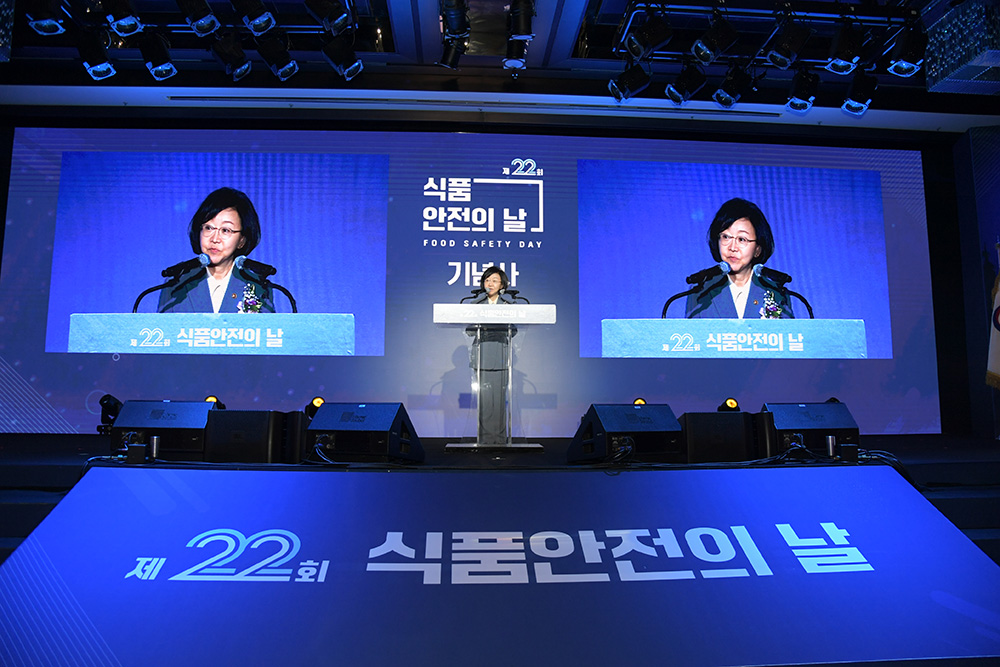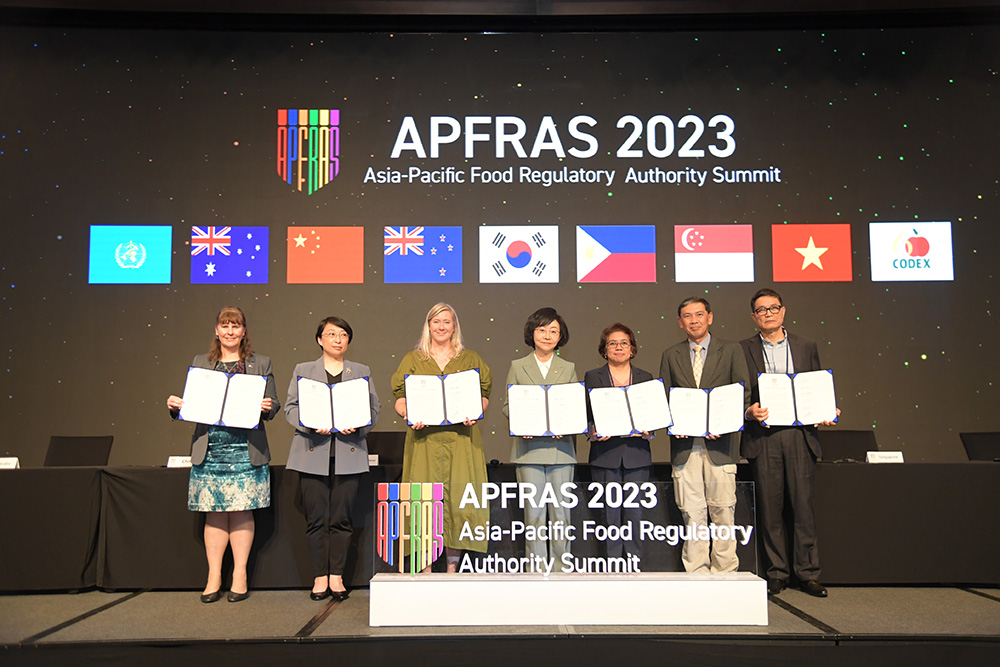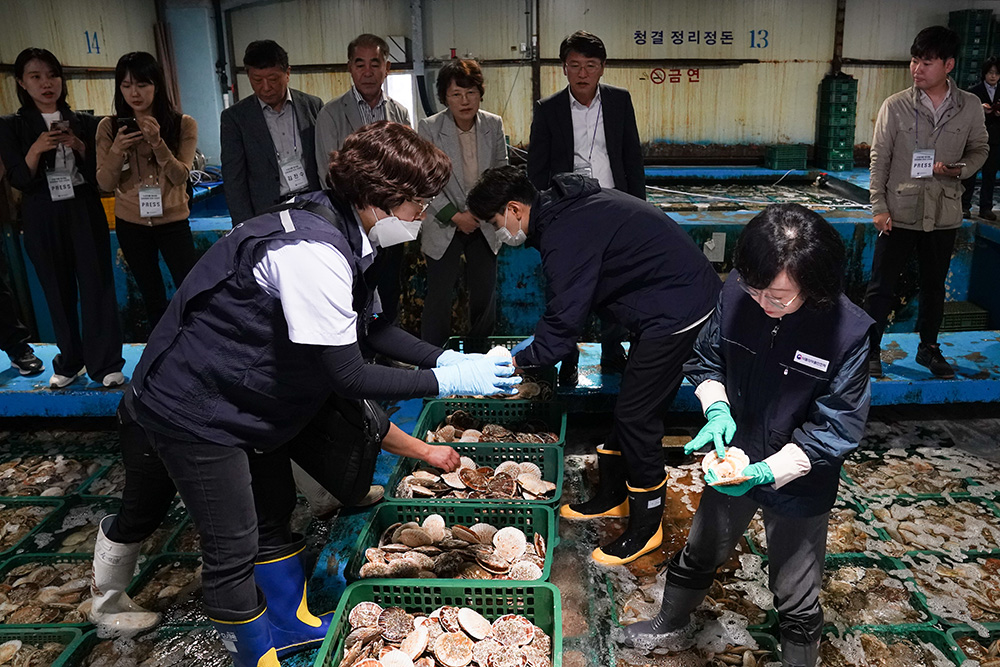Leading the way in food safety: Interview with Dr. Yu-Kyoung Oh, Minister of Food and Drug Safety, Korea
Korea recently marked the successful celebration of the 22nd Korean Food Safety Day and on the occasion of this achievement, we had the opportunity to interview Yu-Kyoung Oh, the Minister of Food and Drug Safety of the Republic of Korea. We wanted to delve into the country's accomplishments in the field of food safety management. The minister shared her insights and outlined the plans to ensure that food safety remains a paramount concern in Korea.
Congratulations on the 22nd Korean Food Safety Day. Could you please tell us more about this important day?
Since 2002, the Ministry of Food and Drug Safety (MFDS) has designated May 14 as Food Safety Day, an annual celebration in Korea. During the ceremony, we highlighted significant food safety policies and management systems, while honoring those who have made valuable contributions to food safety. This event serves as a platform where the government, industry, and consumers unite in making a collective pledge to prioritize and maintain the safety of our food supply.
Additionally, the MFDS has established Food Safety Week (May 7-21) in conjunction with Food Safety Day. This special week acts as a forum for conducting diverse activities aimed at enhancing public awareness about food safety. These activities include consumer campaigns and academic seminars, providing valuable opportunities to educate the public about the importance of food safety. These collective endeavors have yielded remarkable advancements, further solidifying Korea as a global frontrunner in the field of food safety.

Yu-Kyoung Oh, speaking at Food Safety Day 2023.
What were your highlights this year?
The MFDS took a groundbreaking step by organizing the Asia-Pacific Food Regulatory Authority Summit (APFRAS). This summit brought together food regulatory authorities from across the Asia-Pacific region, encompassing countries such as Australia, China, New Zealand, the Philippines, Singapore, and Vietnam. Additionally, key stakeholders such as the World Health Organization (WHO) and the Codex Alimentarius Commission (Codex) also participated in this significant event. The summit provided a valuable opportunity to address regulatory convergence and foster strategic cooperation within the region.

May 2023, Seoul, Korea - Adoption of the Seoul Declaration at the Asia-Pacific Food Regulatory Authority Summit.
Notably, the 22nd Korean Food Safety Day coincided with the APFRAS event, attracting participants from APFRAS member countries such as China, the Philippines, Singapore, Viet Nam, as well as representatives from WHO and Codex. This convergence highlighted Korea's advancements in digitalizing the food safety management system and facilitated the sharing of various policies with other countries.
You mentioned that Korea initiated the Asia-Pacific Food Regulatory Authority Summit. Why is this summit important?
The global food supply chain is intricately interconnected and undergoing rapid transformation. In the wake of the global pandemic and economic downturn, numerous countries have implemented an array of technical barriers. As a result, exporters now encounter additional challenges, such as heightened compliance standards and the introduction of new packaging and labeling requirements.
I am confident that by promoting regulatory harmonization and fostering cooperation among regulatory authorities, we can effectively address these challenges and improve market access.
I believe that APFRAS will play a pivotal role in enhancing regional cooperation on food safety. By facilitating a more effective global approach to safety issues, APFRAS will contribute to ensuring the highest standards of food safety and promoting mutual trust among nations.
Why do you think Korea has managed to become one of the global leaders in food safety? What are your next steps?
I believe the success of the MFDS as a leader in food safety can be attributed to several factors. Firstly, active communication and cooperation with stakeholders such as industry, consumers, and academia have played a crucial role. I firmly believe that ensuring food safety requires more than just government efforts. The MFDS seeks input and opinions from stakeholders, actively engaging with industry, consumers, and academia to review our policies.
Another significant reason behind our success is the implementation of digital technology to enhance the food safety management system. Given Korea's reputation for advanced technologies, the MFDS has taken the initiative to establish an integrated food safety information network. By utilizing this integrated system, we can swiftly and effectively respond to food incidents, ensuring a more efficient approach to safeguarding public health and safety.

May 2023, Busan, Korea - Minister and experts evaluating the radiation levels of imported fishery products at the market.
The third reason lies in our expertise in food safety. The MFDS comprises a dedicated team of over 2 000 experts who specialize in the fields of food and medical products. Each employee possesses a high level of expertise in their respective areas, ensuring a competent workforce. It is through these professional capabilities that we have established Korea as a competitive country in the field of food safety.
Moving forward, the MFDS is committed to actively supporting the growth of the food industry through global cooperation. This entails addressing non-tariff barriers and offering customized regulatory services for alternative foods and medical food. Moreover, we are dedicated to enhancing the food safety management system by harnessing digital technology. This involves establishing a QR code-based digital platform for food safety information, ensuring enhanced transparency and efficiency in delivering crucial information to consumers and stakeholders.
It has been more than 50 years since Korea joined Codex. Why is this important?
When Korea became a member of Codex in 1971, there were several areas of our food safety management system that required improvement. However, through decades of collaboration with Codex, we have made substantial advancements. By adhering to the Hazard Analysis and Critical Control Point (HACCP) principles and guidelines developed by Codex, Korea has developed a tailored HACCP plan that takes into account our national context. This plan has been successfully integrated into our food safety management system, leading to a significant enhancement in our overall approach to ensuring food safety.
Furthermore, Korea has been actively involved in spearheading the development of Codex standards for a range of traditional foods. This includes contributing to the establishment of international standards for beloved delicacies such as kimchi, ginseng products, gochujang, and dried persimmons. Additionally, regional standards have been set for laver products and fermented soybean paste. These dedicated efforts have not only ensured the safety of our cherished traditional foods but have also amplified their global recognition.
Could you please tell us more about your collaboration with Codex?
Our collaboration with Codex has been fruitful and mutually beneficial. Since 1997, the Republic of Korea has seconded positions to the Codex secretariat, providing valuable support to its important work. We have actively contributed to Codex's initiatives, leading the Coordinating Committee for Asia in 2004 and 2006.
Furthermore, the MFDS has dedicated resources to address antimicrobial resistance in food through participation in two terms of the Ad hoc Codex Intergovernmental Task Force on Antimicrobial Resistance, from 2007 to 2011 and from 2017 to 2021.
Korea currently supports a FAO project that implements Codex texts on foodborne antimicrobial resistance. This project involves six countries: Bolivia, Cambodia, Colombia, Mongolia, Nepal, and Pakistan. These countries are actively enhancing their capacity to manage foodborne antimicrobial resistance through activities outlined in the Codex AMR texts.
Additionally, we have strengthened cooperation by making meaningful contributions to the Codex Trust Fund. Utilizing the fund, we organized a training course in Seoul in 2022, attended by government officials from Bhutan, Gambia, Maldives, Mauritius, and Nepal.
Acknowledging the significance of the One Health approach in addressing complex food safety issues, the MFDS plans to support another FAO project that implements this approach in food safety. We recognize the importance of comprehensive solutions and collaboration across sectors when it comes to food safety matters.
Codex is celebrating its 60th anniversary this year. How do you envision the future of Codex?
Firstly, congratulations to Codex on achieving this significant milestone. It is evident that our support will persist. Food safety is a multifaceted issue that requires collaboration and cooperation among all stakeholders. In this regard, Codex provides the ideal platform for countries to convene, address shared concerns, and contribute to food safety.
I firmly believe that Codex will assume an even more crucial role in the future, leading the development of international standards and fostering equitable trade in food. We are thrilled to be part of this journey.
And the last question is personal. What is your favorite food and how do you ensure it is safe to eat?
I enjoy eating a processed seafood delicacy called 'roasted seaweed snack'. While this treat was initially popular primarily in Korea, its reputation for both taste and health benefits has contributed to its rising popularity as a sought-after nutritional snack worldwide.
When I make a purchase, I always prioritize checking the labeling information, particularly regarding the seasoning. Spotting the HACCP logo on a product provides me with a sense of reassurance regarding its safety. Complying with food safety management regulations, the HACCP principle governs the majority of food production. Products that are produced using the HACCP system, duly certified by the MFDS, can proudly display the HACCP logo on their labeling.
Learn more
Ministry of Food and Drug Safety, the Republic of Korea
Action to support implementation of Codex AMR Texts (ACT), supported by the Republic of Korea
Photo credit
Main picture - March 2023, Seoul, Korea - Dr. Yu-Kyoung Oh, Minister of Food and Drug Safety, meeting with the heads of consumer organizations.
© Ministry of Food and Drug Safety, Republic of Korea
Categories
- (11)
- (3)
- Animal Feed (8)
- Antimicrobial Resistance (39)
- Antimicrobial Resistance (78)
- CAC46 (15)
- Codex Texts (20)
- Codex Trust Fund (1)
- Codex60 (19)
- Contaminants (13)
- Contaminants (10)
- COVID-19 (64)
- Elections (6)
- Food Safety (126)
- Labelling (10)
- Nutrition and Labelling (5)
- Nutrition and Labelling (7)
- Observers (23)
- Pesticides (7)
- Standards (78)
- World Food Safety Day (154)


